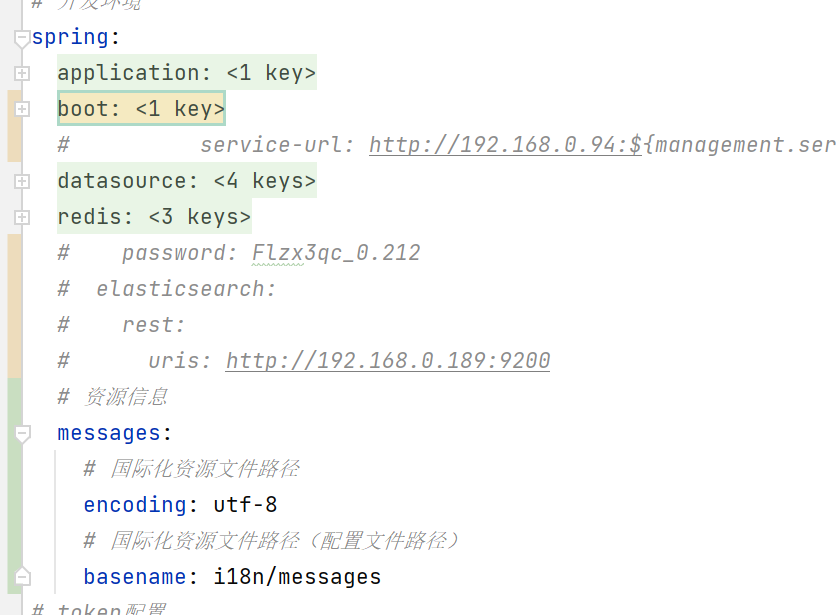package com.ruoyi.common.i18n;
import java.lang.reflect.Field;
import java.util.List;
import java.util.Locale;
import java.util.Objects;
import org.springframework.context.MessageSource;
import org.springframework.context.i18n.LocaleContextHolder;
import org.springframework.context.support.AbstractApplicationContext;
import org.springframework.util.PropertyPlaceholderHelper;
import com.ruoyi.common.utils.ReflectASMUtils;
import com.ruoyi.common.utils.SpringUtils;
import com.ruoyi.common.utils.StringUtils;
public class I18nUtils {
private final static MessageSource messageSource = SpringUtils
.getBean(AbstractApplicationContext.MESSAGE_SOURCE_BEAN_NAME);
private static final PropertyPlaceholderHelper FieldPlaceholderHelper = new PropertyPlaceholderHelper("#{", "}");
private static final PropertyPlaceholderHelper PlaceholderHelper = new PropertyPlaceholderHelper("{", "}", ":",
true);
public static void replaceI18nFields(List<?> objs) {
replaceI18nFields(objs, LocaleContextHolder.getLocale());
}
/**
* 将列表所有对象中@I18nField标注的字段替换为指定国际化语言值
*
* @param objs
* @param locale
*/
public static void replaceI18nFields(List<?> objs, Locale locale) {
if (Objects.isNull(objs)) {
return;
}
objs.forEach(obj -> replaceI18nFields(obj, locale));
}
public static void replaceI18nFields(Object obj) {
replaceI18nFields(obj, LocaleContextHolder.getLocale());
}
/**
* 将对象有@I18nField标注的字段替换为指定国际化语言值
*
* @param obj
* @param locale
*/
public static void replaceI18nFields(Object obj, Locale locale) {
if (Objects.isNull(obj)) {
return;
}
Field[] declaredFields = obj.getClass().getDeclaredFields();
for (Field field : declaredFields) {
if (field.isAnnotationPresent(I18nField.class)) {
I18nField i18nField = field.getAnnotation(I18nField.class);
try {
if (StringUtils.isNotEmpty(i18nField.value())) {
String langStr = i18nField.value();
// 先将#{fieldName}占位替换为obj字段值
langStr = FieldPlaceholderHelper.replacePlaceholders(langStr, placehoderName -> {
Object fieldV = ReflectASMUtils.invokeGetter(obj, placehoderName);
return Objects.nonNull(fieldV) ? fieldV.toString() : StringUtils.EMPTY;
});
String langValue = get(langStr, locale);
ReflectASMUtils.invokeSetter(obj, field.getName(), langValue);
} else {
Object fieldV = ReflectASMUtils.invokeGetter(obj, field.getName());
if (Objects.nonNull(fieldV)) {
String langKey = fieldV.toString();
String langValue = get(langKey, locale);
ReflectASMUtils.invokeSetter(obj, field.getName(), langValue);
}
}
} catch (Exception e) {
e.printStackTrace();
}
}
}
}
/**
* 获取国际化键名对应的当前默认语言值
*
* @param str
* @return
*/
public static String get(String str) {
return get(str, LocaleContextHolder.getLocale());
}
/**
* 获取国际化键名指定的语言值
*
* @param str
* @param locale
* @param args
* @return
*/
public static String get(String str, Locale locale, Object... args) {
if (StringUtils.isEmpty(str)) {
return str;
}
return PlaceholderHelper.replacePlaceholders(str, langKey -> messageSource.getMessage(langKey, args, locale));
}
}
package com.jinw.cms.i18n;
import com.jinw.utils.cms.StringUtils;
import java.lang.annotation.*;
/**
* 类字段添加此注释,根据国际化字典表获取当前语言环境翻译.@see I18nUtils.replaceI18nFields
*
* @author liux
*/
@Documented
@Retention(RetentionPolicy.RUNTIME)
@Target(ElementType.FIELD)
public @interface I18nField {
/**
* 国际化表键名,为空时使用字段值获取当前语言环境值
* <p>
* 可使用占位符来获取当前对象其他字段属性值,例如实体类的ID字段值,可使用#{fieldName},大括号内是字段名,会被替换为指定字段的值。
* </p>
*/
public String value() default StringUtils.EMPTY;
}
spring:
# 资源信息
messages:
encoding: utf-8
# 国际化资源文件路径(配置文件路径)
basename: i18n/messages
本文著作权归作者 [ admin ] 享有,未经作者书面授权,禁止转载,封面图片来源于 [ 互联网 ] ,本文仅供个人学习、研究和欣赏使用。如有异议,请联系博主及时处理。

要怎么全局使用的呢?